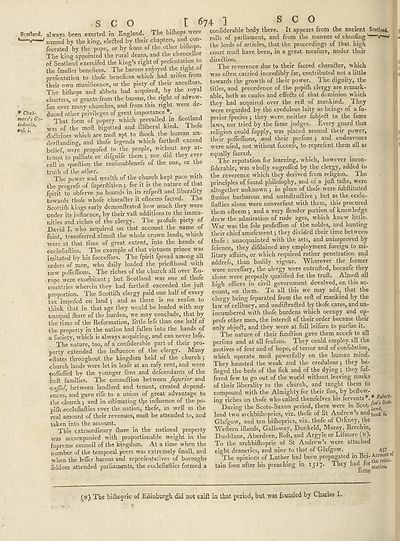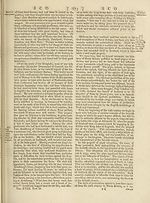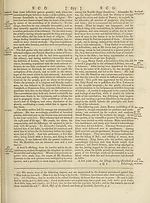Encyclopaedia Britannica, or, a Dictionary of arts, sciences, and miscellaneous literature : enlarged and improved. Illustrated with nearly six hundred engravings > Volume 18, RHI-SCR
(712) Page 674
Download files
Complete book:
Individual page:
Thumbnail gallery: Grid view | List view

SCO
t 674 ]
SCO
* Chal¬
mers's Ca-
iedonia,
vol. i.
Scotland, always been exerted in England. The bifhops were
named by the king, elefted by their chapters, and con-
fecrated by the pope, or by fome of the other bifhops.
The king appointed the rural deans, and the chancellor
of Scotland e’xercifed the king’s right of prefentation to
the fmaller benefices. The barons enjoyed the right ot
prefentation to thofe benefices which had. arifen from
their own munificence, or the piety of their anceftors.
The bifhops and abbots had acquired, , by the royal
charters, or grants from the barons, the right of advow-
fon over many churches, and from this right were de¬
duced other privileges of great importance
That form of popery which prevailed in Scotland
was of the mod bigotted and illiberal kind. Thofe
do£trines which are moft apt to fho.ck the human un-
derflanding, and thofe legends which fartheft exceed
belief, were propofed to the people, without any at¬
tempt to palliate or difguife them ; nor did they ever
call in queftion the reafonablenefs of the one, or the
truth of the other. .
The power and wealth of the church kept pace with
the progrefs of fuperftition j for it is the nature of that
fpirit to obferve no bounds in its refpeft and liberality
towards thofe whofe charadter it efteems facred. The
Scottifh kings early demonftrated how much they rvere
under its influence, by their vaft additions to the immu¬
nities and riches of the clergy. 1 he profufe piety of
David I. who acquired on that account the name, of
faint, transferred almoft the whole crown lands, which
were at that time of great extent, into the hands of
ecclefiaftics. The example of that virtuous prince was
imitated by his fucceffors. The fpirit fpread among all
orders of men, who daily loaded the priefthood with
new poflfeflions. The riches of the church all over Eu¬
rope were exorbitant} but Scotland was one of thofe
countries wherein they had fartheft exceeded the juft
proportion. The Scottifh clergy paid one half of every
tax impofed on land 5 and as there is no reafon to
think that in that age they would be loaded with any
unequal lhare of the burden, we may conclude, that by
the time of the Reformation, little lefs than one half of
the property in the nation had fallen into the hands of
a fociety, which is always acquiring, and can never lofe.
The nature, too, of a confiderable part of their pro¬
perty extended the influence of the clergy. Many
eftates throughout the kingdom held of the church *,
church lands were let in leafe at an eafy rent, and were
poffefled by the younger fons and defcendants of the
beft families. The connexion between fuperior and
vaffal) between landlord and tenant, created depend¬
ences, and gave rife to a union of great advantage to
the church *, and in eftimating ifye influence of the po-
pifh ecclefiaftics over the nation, thefe, as well as the
real amount of their revenues, muft be attended to, and
taken into the account.
This extraordinary (hare in the national property
was accompanied with proportionable weight in the
fupreme council of the kingdom. At a time when the
number of the temporal peers was extremely fmall, and
when the leffer barons and reprefentaiives of boroughs
feldom attended parliaments, the ecclefiaftics formed a
confiderable body there. It appears from the ancient ScotlawL,
rolls of parliament, and from the manner of choofing
the lords of articles, that the proceedings of that high
court muft have been, in a great meafure, under their
direction.
The reverence due to their facred chara&er, which
was often carried incredibly far, contributed not a little
towards the growth of their power. The dignity, the
titles, and precedence of the popifti clergy are remark¬
able, both as caufes and effe&s of that dominion which
they had acquired over the reft of mankind. I hey
were regarded by the credulous laity as beings of a fu¬
perior fpecies •, they were neither fubjeft to the fame
laws, nor tried by the fame judges. Every guard that
religion could fupply, was placed around their power,
their poffelfions, and their perfons ; and endeavours
were ufed, not without fuccefi, to reprefent them all as
equally facred.
The reputation for learning, which, however incon-
fiderable, was wholly engroffed by the clergy, added to
the reverence which they derived from religion. The
principles of found philofophy, and of a juft tafte,.were
altogether unknown } in place of thefe, were fubftituted
ftudies barbarous and uninftruftive 5 but as the eccle¬
fiaftics alone were converfant with them, this procured
them efteem j and a very flender portion of knowledge
drew the admiration of rude ages, which knew little.
War was the foie profeffion of the nobles, and hunting
their chief amufement; they divided their time between
thefe : unacquainted with the arts, and unimproved by
fcience, they difdained any employment foreign to mi¬
litary affairs, or which required rather penetration and
addrefs, than bodily vigour. Wherever the former
were neceffary, the clergy were entrufted, becaufe they
alone were properly qualified for the truft. Almoft all
high offices in civil government devolved, on this ac¬
count, on them. To all this we may add, that the
clergy being feparated from the reft of mankind by the
law of celibacy, and undiftradted by thofe cares, and un¬
incumbered with thofe burdens which occupy and op-
prefs other men, the intereft of their order became their
only objedl, and they were at full leifure to purfue it.
The nature of their fundlion gave them accefs to all
perfons and at all feafons. They could employ all the
motives of fear and of hope, of terror and of confolation,
which operate moft powerfully on the human mind.
They haunted the weak and the credulous 5 they be-
fieged the beds of the fick and of the dying ; they fuf-
fered few to go out of the world without leaving marks
of their liberality to the church, and taught them to
compound with the Almighty for their fins, by beftow- .
ing riches on thofe who called themfelves his fervants*.*
During the Scoto-Saxon period, there were in Scot-/™'
land two archbifhoprics, viz. thofe of St Andrew’s andko0kii.
Glafgow, and ten bifhoprics, viz. thofe of Orkney, the
Weftern iflands, Galloway, Dunkeld, Moray, Brechin,
Dunblane, Aberdeen, Rofs, and Argyleor Lifmore (n).
To the archbifhopric of St Andrew’s wrere attached
eight deaneries, and nine to that of Glafgow. . . 457 f
The opinions of Luther had been propagated in Bri- Amount
tain foon after his preaching in 1517. They had^ for^t}on.
fome
(n) The bilhopric of Edinburgh did not exift in that period, but was founded by Charles L
t 674 ]
SCO
* Chal¬
mers's Ca-
iedonia,
vol. i.
Scotland, always been exerted in England. The bifhops were
named by the king, elefted by their chapters, and con-
fecrated by the pope, or by fome of the other bifhops.
The king appointed the rural deans, and the chancellor
of Scotland e’xercifed the king’s right of prefentation to
the fmaller benefices. The barons enjoyed the right ot
prefentation to thofe benefices which had. arifen from
their own munificence, or the piety of their anceftors.
The bifhops and abbots had acquired, , by the royal
charters, or grants from the barons, the right of advow-
fon over many churches, and from this right were de¬
duced other privileges of great importance
That form of popery which prevailed in Scotland
was of the mod bigotted and illiberal kind. Thofe
do£trines which are moft apt to fho.ck the human un-
derflanding, and thofe legends which fartheft exceed
belief, were propofed to the people, without any at¬
tempt to palliate or difguife them ; nor did they ever
call in queftion the reafonablenefs of the one, or the
truth of the other. .
The power and wealth of the church kept pace with
the progrefs of fuperftition j for it is the nature of that
fpirit to obferve no bounds in its refpeft and liberality
towards thofe whofe charadter it efteems facred. The
Scottifh kings early demonftrated how much they rvere
under its influence, by their vaft additions to the immu¬
nities and riches of the clergy. 1 he profufe piety of
David I. who acquired on that account the name, of
faint, transferred almoft the whole crown lands, which
were at that time of great extent, into the hands of
ecclefiaftics. The example of that virtuous prince was
imitated by his fucceffors. The fpirit fpread among all
orders of men, who daily loaded the priefthood with
new poflfeflions. The riches of the church all over Eu¬
rope were exorbitant} but Scotland was one of thofe
countries wherein they had fartheft exceeded the juft
proportion. The Scottifh clergy paid one half of every
tax impofed on land 5 and as there is no reafon to
think that in that age they would be loaded with any
unequal lhare of the burden, we may conclude, that by
the time of the Reformation, little lefs than one half of
the property in the nation had fallen into the hands of
a fociety, which is always acquiring, and can never lofe.
The nature, too, of a confiderable part of their pro¬
perty extended the influence of the clergy. Many
eftates throughout the kingdom held of the church *,
church lands were let in leafe at an eafy rent, and were
poffefled by the younger fons and defcendants of the
beft families. The connexion between fuperior and
vaffal) between landlord and tenant, created depend¬
ences, and gave rife to a union of great advantage to
the church *, and in eftimating ifye influence of the po-
pifh ecclefiaftics over the nation, thefe, as well as the
real amount of their revenues, muft be attended to, and
taken into the account.
This extraordinary (hare in the national property
was accompanied with proportionable weight in the
fupreme council of the kingdom. At a time when the
number of the temporal peers was extremely fmall, and
when the leffer barons and reprefentaiives of boroughs
feldom attended parliaments, the ecclefiaftics formed a
confiderable body there. It appears from the ancient ScotlawL,
rolls of parliament, and from the manner of choofing
the lords of articles, that the proceedings of that high
court muft have been, in a great meafure, under their
direction.
The reverence due to their facred chara&er, which
was often carried incredibly far, contributed not a little
towards the growth of their power. The dignity, the
titles, and precedence of the popifti clergy are remark¬
able, both as caufes and effe&s of that dominion which
they had acquired over the reft of mankind. I hey
were regarded by the credulous laity as beings of a fu¬
perior fpecies •, they were neither fubjeft to the fame
laws, nor tried by the fame judges. Every guard that
religion could fupply, was placed around their power,
their poffelfions, and their perfons ; and endeavours
were ufed, not without fuccefi, to reprefent them all as
equally facred.
The reputation for learning, which, however incon-
fiderable, was wholly engroffed by the clergy, added to
the reverence which they derived from religion. The
principles of found philofophy, and of a juft tafte,.were
altogether unknown } in place of thefe, were fubftituted
ftudies barbarous and uninftruftive 5 but as the eccle¬
fiaftics alone were converfant with them, this procured
them efteem j and a very flender portion of knowledge
drew the admiration of rude ages, which knew little.
War was the foie profeffion of the nobles, and hunting
their chief amufement; they divided their time between
thefe : unacquainted with the arts, and unimproved by
fcience, they difdained any employment foreign to mi¬
litary affairs, or which required rather penetration and
addrefs, than bodily vigour. Wherever the former
were neceffary, the clergy were entrufted, becaufe they
alone were properly qualified for the truft. Almoft all
high offices in civil government devolved, on this ac¬
count, on them. To all this we may add, that the
clergy being feparated from the reft of mankind by the
law of celibacy, and undiftradted by thofe cares, and un¬
incumbered with thofe burdens which occupy and op-
prefs other men, the intereft of their order became their
only objedl, and they were at full leifure to purfue it.
The nature of their fundlion gave them accefs to all
perfons and at all feafons. They could employ all the
motives of fear and of hope, of terror and of confolation,
which operate moft powerfully on the human mind.
They haunted the weak and the credulous 5 they be-
fieged the beds of the fick and of the dying ; they fuf-
fered few to go out of the world without leaving marks
of their liberality to the church, and taught them to
compound with the Almighty for their fins, by beftow- .
ing riches on thofe who called themfelves his fervants*.*
During the Scoto-Saxon period, there were in Scot-/™'
land two archbifhoprics, viz. thofe of St Andrew’s andko0kii.
Glafgow, and ten bifhoprics, viz. thofe of Orkney, the
Weftern iflands, Galloway, Dunkeld, Moray, Brechin,
Dunblane, Aberdeen, Rofs, and Argyleor Lifmore (n).
To the archbifhopric of St Andrew’s wrere attached
eight deaneries, and nine to that of Glafgow. . . 457 f
The opinions of Luther had been propagated in Bri- Amount
tain foon after his preaching in 1517. They had^ for^t}on.
fome
(n) The bilhopric of Edinburgh did not exift in that period, but was founded by Charles L
Set display mode to:
![]() Universal Viewer |
Universal Viewer | ![]() Mirador |
Large image | Transcription
Mirador |
Large image | Transcription
Images and transcriptions on this page, including medium image downloads, may be used under the Creative Commons Attribution 4.0 International Licence unless otherwise stated. ![]()
| Permanent URL | https://digital.nls.uk/193027963 |
|---|
| Attribution and copyright: |
|
|---|
| Description | Ten editions of 'Encyclopaedia Britannica', issued from 1768-1903, in 231 volumes. Originally issued in 100 weekly parts (3 volumes) between 1768 and 1771 by publishers: Colin Macfarquhar and Andrew Bell (Edinburgh); editor: William Smellie: engraver: Andrew Bell. Expanded editions in the 19th century featured more volumes and contributions from leading experts in their fields. Managed and published in Edinburgh up to the 9th edition (25 volumes, from 1875-1889); the 10th edition (1902-1903) re-issued the 9th edition, with 11 supplementary volumes. |
|---|---|
| Additional NLS resources: |
|

